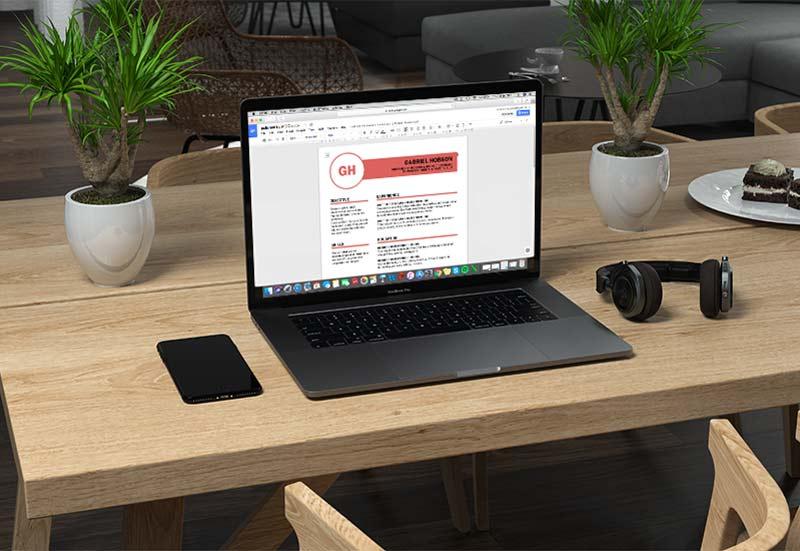
25+ Free Resume Templates for Microsoft Word to Download
Stop struggling with your Word resume template. Get a beautiful resume in 5 minutes! See our list of the best resume and CV templates for Word that you can quickly modify & tweak.

What are Microsoft Office skills? How to list them on a resume? And what does it mean to be a “proficient” MS Office user? Read on and find out.
Listing MS Office skills on a resume feels a bit like writing you can use a mobile phone:
It’s obvious.
But if you’re proficient in Microsoft Office, putting “MS Excel” at the top of your resume skills list is not enough. Hiring managers want evidence. That’s why you need to know how to list and describe your skills like an MOS Master.
This guide will show you:
Want to save time and have your resume ready in 5 minutes? Try our resume builder. It’s fast and easy to use. Plus, you’ll get ready-made content to add with one click. See 20+ resume templates and create your resume here.
Sample resume made with our builder—See more resume examples here.
Wondering how to create a killer skills section for your resume? Look at our dedicated guides:
1
Microsoft Office Suite, commonly known as Microsoft Office or simply Office, is a set of productivity tools used by businesses around the world. However, it's used for much more than just writing texts in Word and creating tables in Excel. This suite enables users to perform hundreds of advanced tasks.
True—some jobs require only the basics. But for most of mid- and high-level positions you need to know a few tricky functionalities, too.
MS Office comprises of:
Microsoft Office Suite offers programs that can be used both in a web browser and on a computer.
The two good oldies below may now be used only on PCs:
Companies very often use Microsoft Office 365 Business with Microsoft Teams and other apps such as Microsoft OneDrive and Microsoft SharePoint that make teamwork easier.
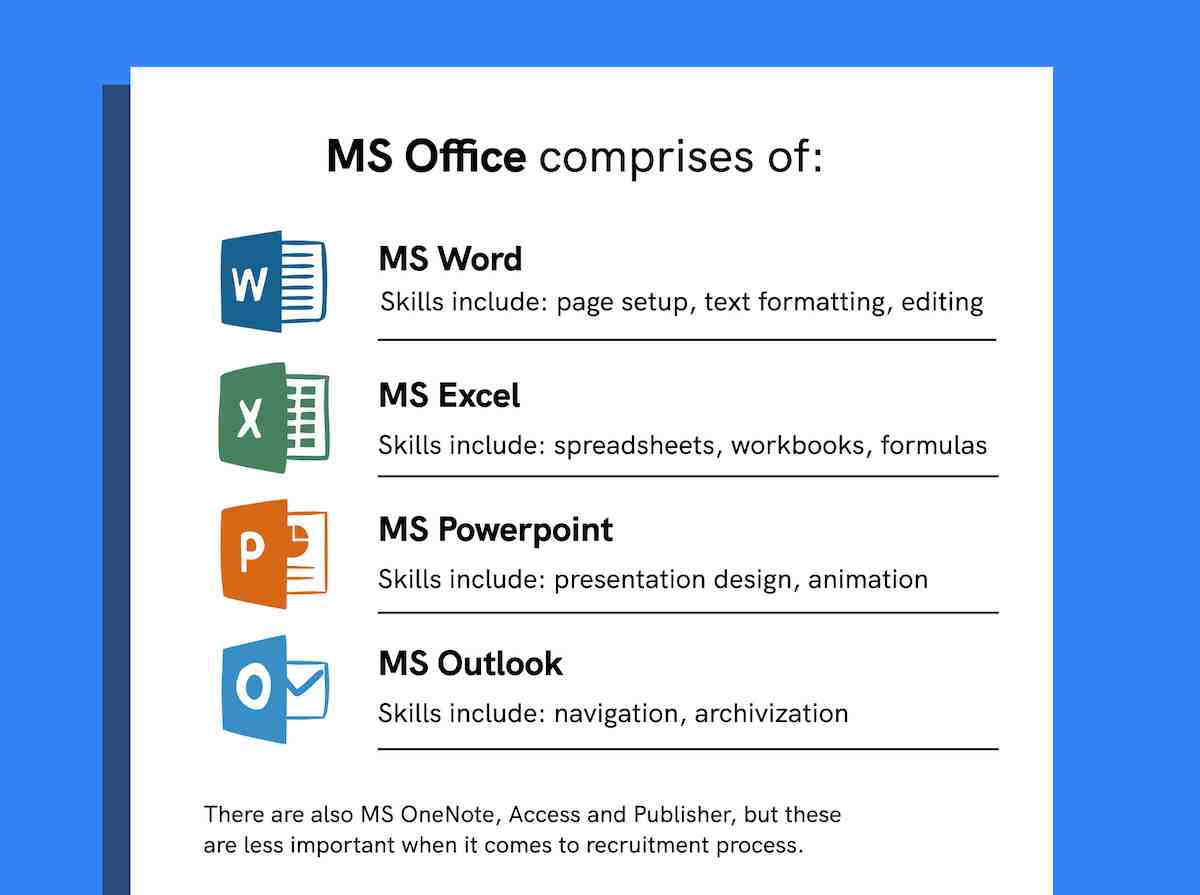
Still, when a job ad states “Microsoft Office skills,” they probably mean this quartet: MS Word, Excel, PowerPoint, and Outlook:
Enter the classic resume buzz phrase:
Proficient in Microsoft Office typically means you are able to use MS Word to edit text documents, create templates, and automate the creation of tables of content. Proficient in Excel means running and creating functions, pivot tables, and charts. Plus, you can make slideshows in PowerPoint.
That's the theory. In practice, most candidates feel obliged to use this phrase on their resume without really being able to do anything more than treat spreadsheets as tables and write up a report on Word.
Here's what to do instead:
Fluent in Microsoft Word, proficient in Microsoft Excel—it can be phrased in many different ways on your resume, but you have to remember that it means more than just editing text or summing up cells.
So if you have only those basic skills in Microsoft Office—
Leave them out. Why?
Firstly, everybody knows the essentials of the Office suite. It’s a basic know-how.
Secondly, you might confuse the recruiter. They see proficient in Excel and they think: macros, pivot tables, and VLOOKUP. What you think: adding a row, formatting a table, and removing duplicates.
When given a question about it or even worse—a practical task—you will turn out as a liar. And that means an instant “No, thank you.”
So save your reputation and don’t list Microsoft Office skills which you only have a basic grasp of.
When else listing MS Office on a resume is a poor decision?
When it’s obvious that you can use it.
You don’t need to mention MS Office if you’re high-tech professional.
Or if you’re after a job that won’t probably require MS Office skills, like nursing, graphic design, or let’s say acting.
Now, let’s check what proficiency in Microsoft Office really means:
All those technical skills require a healthy dose of softer skills:
See? That’s quite a lot of skills. And if you can tick only some of those points for each MS Office component, it means you’re not proficient.
MS Office proficiency is sometimes described in terms of levels of mastery: beginner, intermediate, advanced. The lowest level lets users open or create documents, enter or update information. Intermediate users would be able to make bulk changes or operations. Advanced users should be able to run macros and create their own, use VLOOKUP and pivot tables.
On Word, they'd be able to add multimedia and create automatic tables of content. As you can see, different tools present different levels of challenge. Plus, recruiters don't quite like self-evaluations, so it's best to skip proficiency levels and explain what it is exactly that you can do.
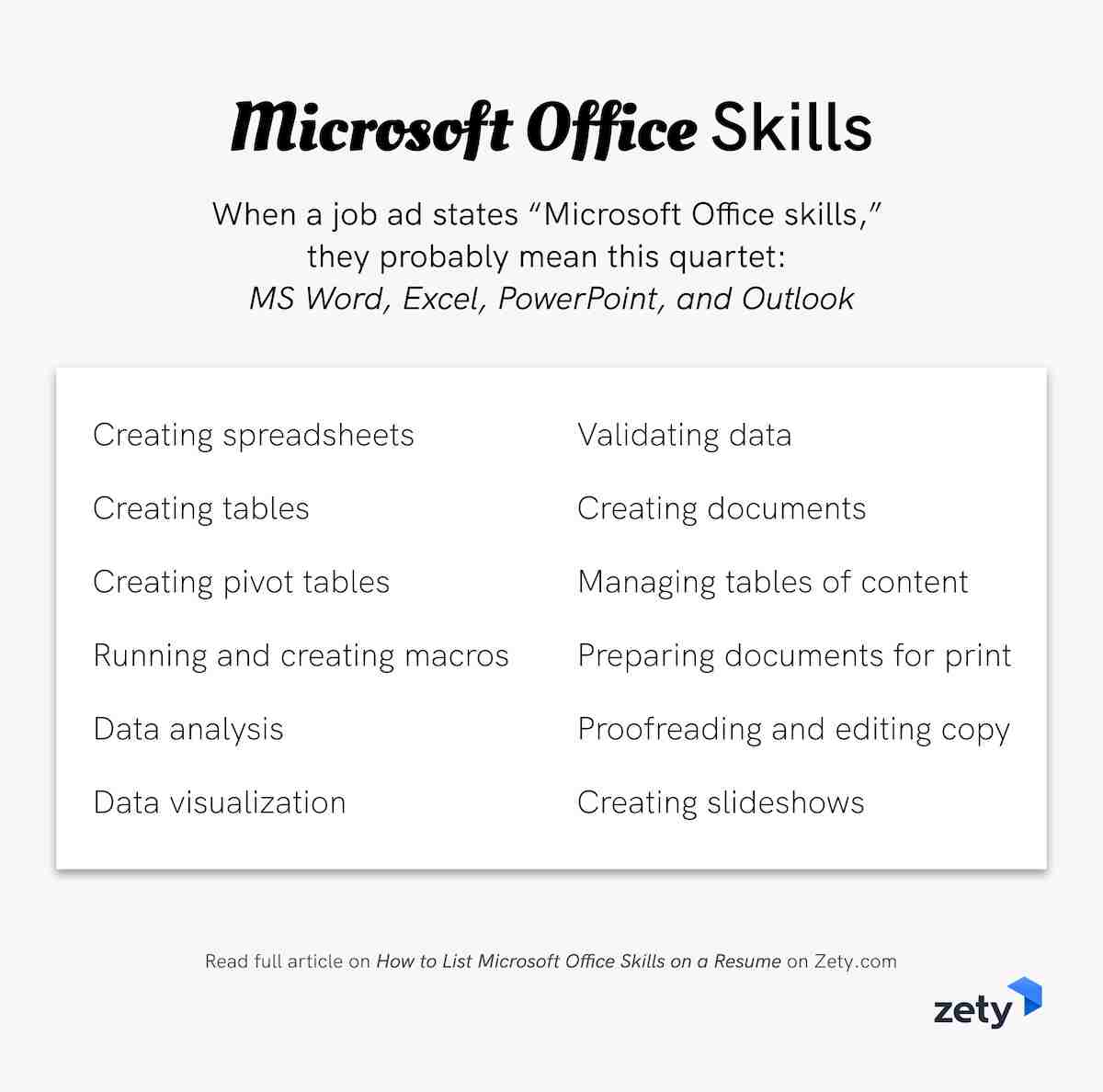
Looking for examples of other computer skills to put on a resume? Check out this guide: Computer Skills: Best Resume Computer Skills Employers Want
When making a resume in our builder, drag & drop bullet points, skills, and auto-fill the boring stuff. Spell check? Check. Start building a professional resume template here for free.
When you’re done, Zety’s resume builder will score your resume and tell you exactly how to make it better.
2
See the example below to better understand what we mean:
| right |
|---|
|
Why does this example work so well?
First, our candidate created a master list of all the MS Office skills they had.
Then, read the job offer carefully and highlighted critical skills.
Finally, they picked only skills from the master list that matched the job description.
Pro Tip: Another reason why you should tailor your resume to the job ad? Applicant Tracking Systems (ATS). Many companies today use it to scan candidates’ resumes for skills. MS Office skills in the job ad are almost always reiterated in the ATS settings.
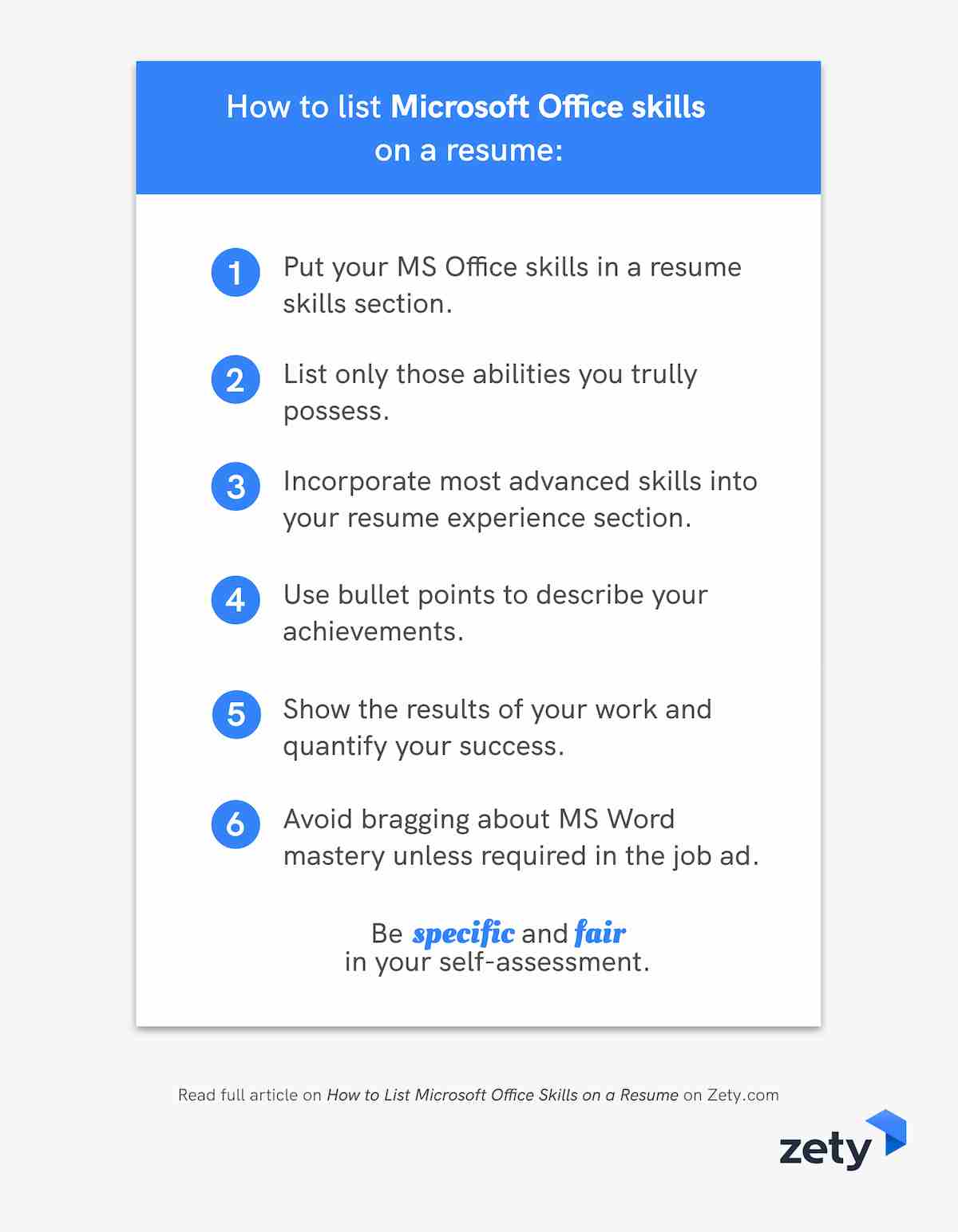
Still not sure how to prepare a custom-made resume for a job? Check out our dedicated guide: 6 Tips on How to Tailor Your Resume to a Job Description (Examples)
3
LinkedIn lists data science, business analysis, writing, and editing among top 25 skills companies need most nowadays. It means a basic understanding of MS Office is not enough.
If you want to demonstrate your proficiency in Microsoft Office in a formal way, prove your advanced skills, and increase your chances of landing a job interview, consider joining one of the Microsoft Office Certification programs.
These include:
The programs all end with a final exam and certification.
There is also plenty of MS Office courses available online (try Udemy, Coursera, or Skillshare).
Want to list your certifications on a resume in a professional way? Here’s how to do it: How to List Certifications on a Resume: Guide (+20 Examples)
Plus, a great cover letter that matches your resume will give you an advantage over other candidates. You can write it in our cover letter builder here. Here's what it may look like:
See more cover letter templates and start writing.
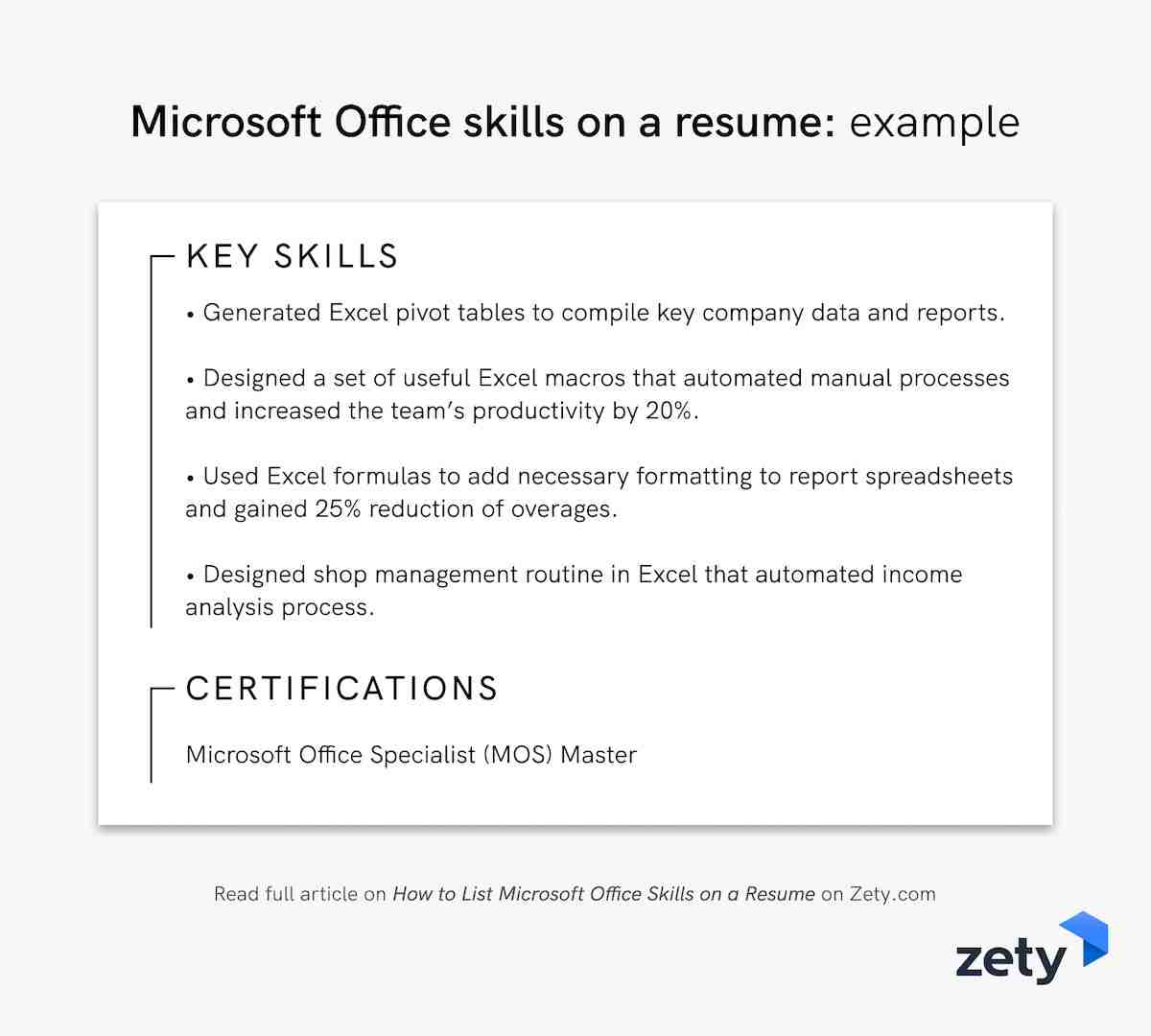
Here’s a short recap of how to list your MS Office skills on a resume:
Still not sure how to describe proficiency in Microsoft Office? If you have any thoughts on how to list Microsoft Office skills on resume, give us a shout in the comments. Thanks for writing in!
Stop struggling with your Word resume template. Get a beautiful resume in 5 minutes! See our list of the best resume and CV templates for Word that you can quickly modify & tweak.
Whether it’s naming a resume file or cover letter, using dashes or underlines, or capitalization questions, this guide has the answers on how to save resumes and cover letters.
The way you structure your resume could mean the difference between landing an interview and rejection. But do you really know how to organize your resume in the most effective way?

